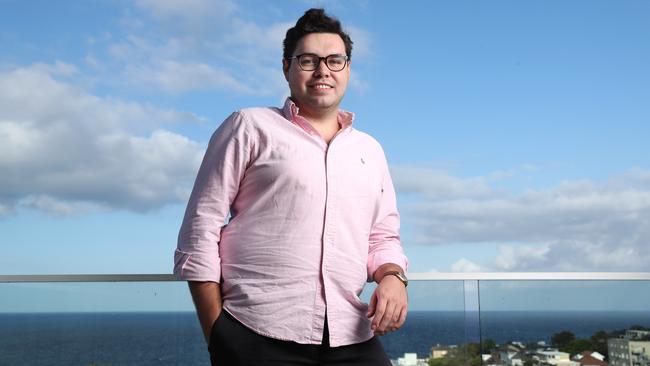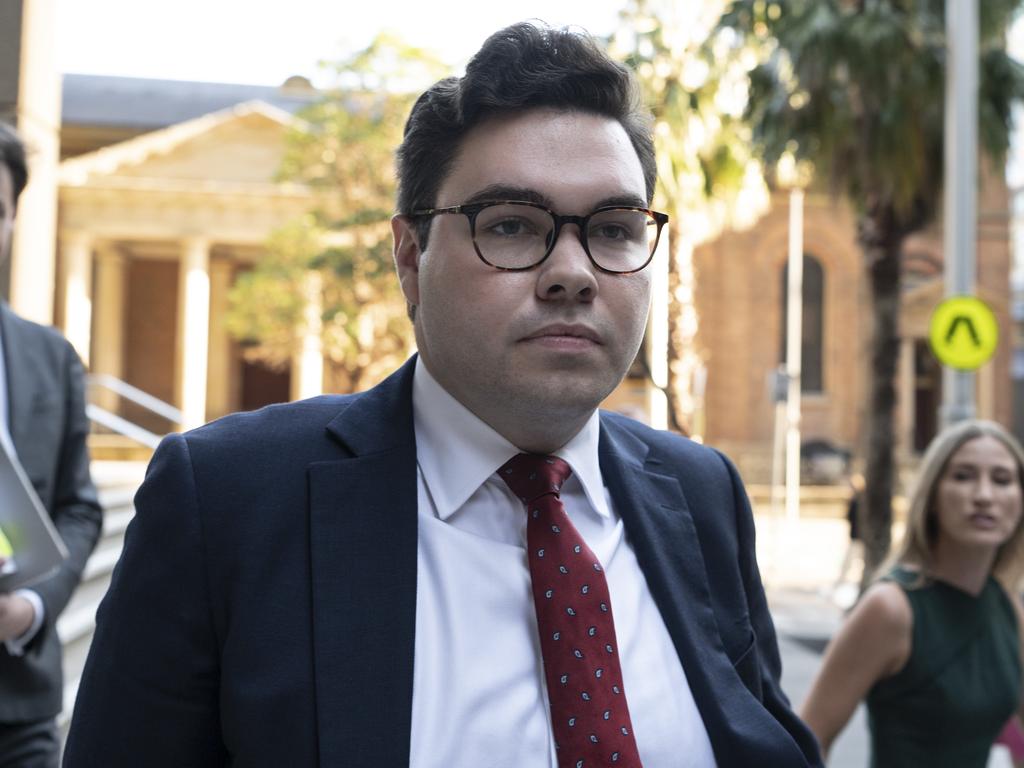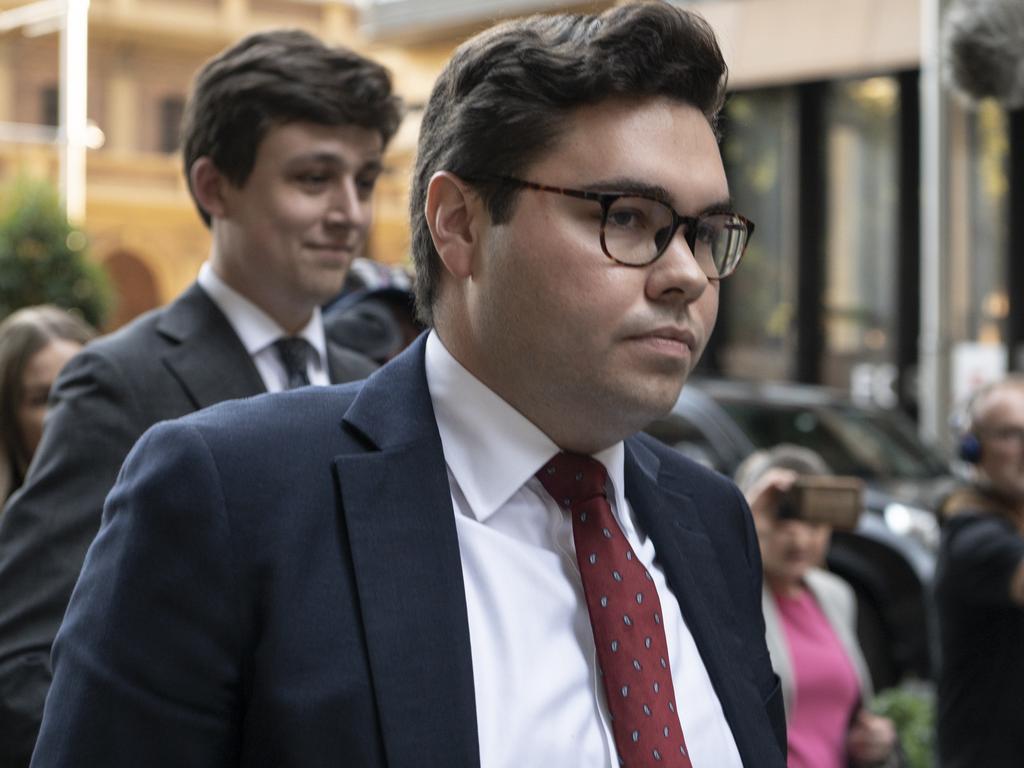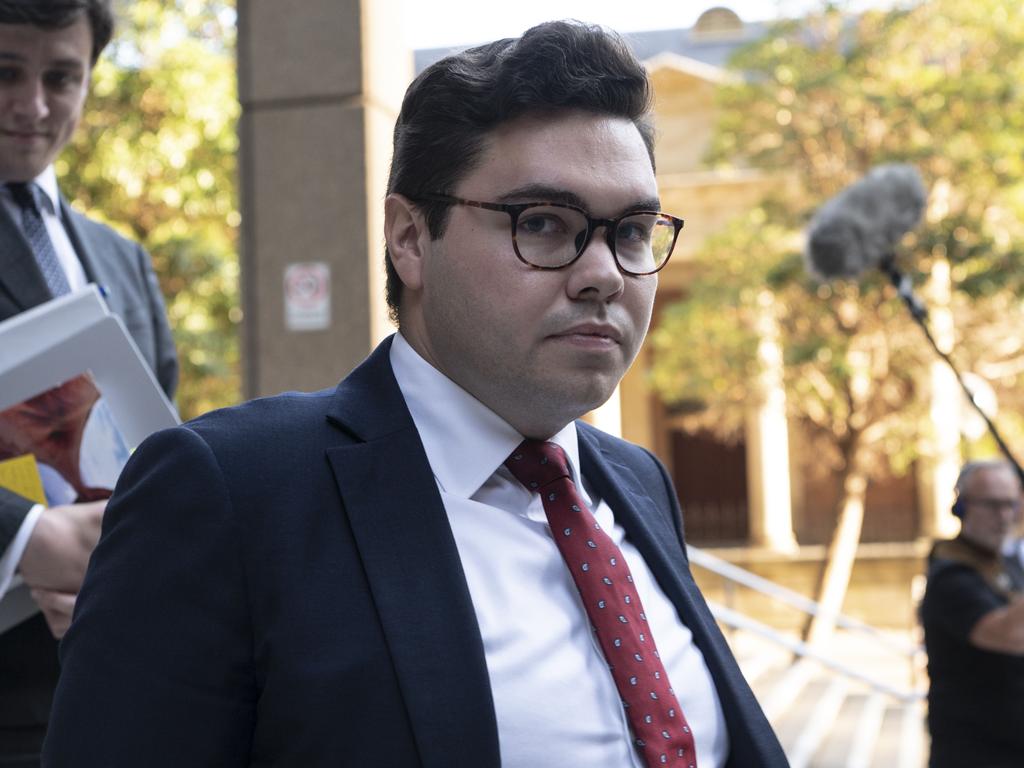Bruce Lehrmann interview: ex-Liberal staffer shocked at judge’s comment as Lisa Wilkinson case begins
In his first interview, Bruce Lehrmann has revealed the judge who presided over his trial for the alleged rape of Brittany Higgins made a comment to his barrister, which showed a possible ‘apprehension of bias’ against him.

In his first media interview, Bruce Lehrmann has revealed the judge who presided over his trial for the alleged rape of Brittany Higgins made a comment to his barrister at a secret meeting early in the trial, which Mr Lehrmann says showed a possible “apprehension of bias” against him.
The former Liberal staffer, now 27, has been reluctant to speak publicly about the events that saw him catapulted into the national consciousness after Ms Higgins accused him of raping her on a couch in Parliament House in March 2019.
But Mr Lehrmann is breaking his silence because he believes a comment made to his lawyer by Chief Justice Lucy McCallum in which she contemplated a guilty plea – that would have almost certainly sent him to prison — has profound implications for the criminal justice system.
Mr Lehrmann has told The Weekend Australian that when Ms Higgins failed to turn up to court midway through her cross-examination, and barely a week into a trial originally set down for six weeks, Chief Justice McCallum informed his lawyer that if Mr Lehrmann pleaded guilty she would take that early plea into consideration when sentencing him.
Mr Lehrmann said his barrister, Steven Whybrow SC, considered the judge’s comment would be so upsetting to his client that he did not tell him at the time. The comment was made at an early point in the trial when Ms Higgins had given only part of her evidence and failed to return to court when expected, reportedly for mental health reasons, and before more than two dozen witnesses had appeared.
Senior criminal lawyers contacted by The Weekend Australian say that when a judge informs an accused person that a guilty plea will result in a discount on sentence, that should always happen in open court, where it is recorded in a transcript, and where judges can make the appropriate comments to avoid a perception of bias.
Mr Lehrmann, who has always denied the accusations against him, says that he only recently learnt of the conversation and was shocked. “I’ve only found this out a few weeks ago and I was choking back tears,” he said. Rightly or wrongly, he interpreted the judge’s comments as an invitation to plead guilty.
“I took her comments to mean that if I did the ‘right thing’ by pleading guilty, given Ms Higgins was suffering mental health issues, the judge would do the right thing by me come sentencing,” Mr Lehrmann said.
He said he was content with the decision by his barrister not to relay the comment to him at the time, because of previous instructions he had provided.
“I mean, I was quite upset. Steve, of course apologised for not telling me, however, his justification for not telling me is incredibly sound because he and the rest of my team knew that I was never ever going to change my plea,” Mr Lehrmann said.
“The other aspect was, as he says, he has a duty of care and the amount of stress that I’ve been under, he was trying to keep me alive.”
He said he felt the comments raised a risk of an apprehension of bias. “There were some people around me that said there should have been an application to have her recused,” Mr Lehrmann said. A senior member of the Sydney Bar told The Weekend Australian that Chief Justice McCallum’s comments were unusual. “The first point is that he [Lehrmann] was at that stage in the jury’s charge, not the judge’s charge,” the barrister, who asked not to be identified, told The Weekend Australian.
“The judge is judge of the law, but not the judge of the facts; and while someone could always suddenly plead guilty in the middle of the trial, it’s certainly not for the judge to be doing anything to suggest or encourage that course.”
The barrister said that while it is always open to a defendant to plead guilty at any stage, the judge’s comment was highly irregular, because it was not the sort of matter that is usually discussed in chambers.
The barrister said that ordinarily, in-chambers discussions between judge and counsel are confined to issues that are in everyone’s equal interests to resolve, such as the location of personnel or changing the hours at which the court sits.
“As soon as anything strays onto the issues of the case in these discussions, the judge would ordinarily say: we won’t go there, we’ll do that in open court,” the barrister said. “This is a conversation of a completely different nature.”
Another Sydney criminal barrister told The Weekend Australian: “It’s quite odd for a judge to instigate a discussion of that kind. It’s more common for these conversations to be instigated by the parties.”
A third barrister said the practice of trial judges inviting counsel into their chambers for private conversations should not occur as often as it does, but did not think it was inappropriate for a trial judge, even at the outset of the case, to “offer a willingness to give a discount for a late guilty plea to avoid the expense and burden of a trial, as long as that intimation is made while both counsel are present”.
The Weekend Australian sent questions to Chief Justice McCallum, including whether she had made the comments and whether they were appropriate.
The Registrar of the ACT Supreme Court, Jayne Reece, responded that it was not appropriate for courts to make public comment about individual cases but observed “two matters of legal principle”.
“First, if any counsel became aware during a criminal trial of a proper basis to apprehend bias on the part of the trial judge, it would be the duty of that counsel to make an application requesting the judge to recuse herself or himself on that basis.
“Secondly, the entitlement of an accused person to a discount on sentence to reflect the utilitarian value of a plea of guilty (including the quantum of the discount that should be allowed according to the point of the proceedings at which the plea was entered) is well established and well known to counsel practising at the criminal Bar.” Mr Whybrow told The Weekend Australian any such matters would be legally privileged communications with a client and in any event would be confidential communications. He said at no stage did he have any communications with the Chief Justice where counsel or representatives of the Director of Public Prosecutions were not present or included in any communication.
Chief prosecutor Shane Drumgold SCwas approached for comment but did not respond before publication deadline.
Mr Lehrmann says it was particularly shocking to learn when the conversation took place because the trial had barely begun.
“To hear this happened very early on in the trial, before any other evidence had even been submitted, presented, heard, cross-examined – I couldn’t believe it. Even this far gone from the trial, when he [Whybrow] told me, I just lost it, I broke down completely,” he said.
In the two trial days immediately before the comment by the Chief Justice, on Thursday, October 6, and Friday, October 7, 2022, a number of discrepancies had arisen during Ms Higgins’ cross-examination by Mr Whybrow. Among them:
● Ms Higgins said she put the white dress she had worn under her bed and it sat there for six months, unwashed, but later admitted she wore it in Perth seven weeks later during an election campaign dinner with her boss, minister Linda Reynolds, after being shown a photo;
● Ms Higgins suggested she was in a bathroom suffering a panic attack for possibly some hours when in fact she was at farewell celebrations for her former boss, Liberal MP Steve Ciobo;
● Ms Higgins suggested that she asked her father to come to Canberra after the alleged rape but texts revealed his visit had been prearranged;
● Ms Higgins made multiple statements to various people and police that she had made or been to doctors’ appointments but had not been to any, and there was no evidence they were made;
● Ms Higgins admitted deleting phone messages before going to police, including text exchanges with a Parliament House security guard on the afternoon of the alleged rape, and deleting a single message from a text thread with her former boyfriend Ben Dillaway where she said “Not interested in pursuing, but it’s all beyond strange”;
● Ms Higgins acknowledged refusing to hand her phone to police and of making appointments with police that she didn’t turn up to, texting boyfriend David Sharaz: “I’m clearing out my phone ahead of the police”;
● Ms Higgins drafted chapter headings and an outline for a book before The Project TV interview and before going to police, and on March 16, 2021, received confirmation from columnist Peter FitzSimons that there was a publisher’s offer of $325,000.
After the weekend break, on the morning of Monday, October 10, it became apparent that Ms Higgins had not arrived at court to continue her cross-examination.
A secret meeting was held in chambers between Chief Justice McCallum, Mr Drumgold and Mr Whybrow, at which the judge explained that Ms Higgins was suffering mental health issues.
Chief Justice McCallum stated that the reason for her non-attendance was not to be reported.
Mr Lehrmann says he had earlier asked Mr Whybrow to seek a suppression order on the mental health reasons for her absence.
He said he was concerned that if the reason she was absent from the court was made public it would induce sympathy.
That Monday when Ms Higgins did not appear, the jury instead listened to Mr Lehrmann’s police record of interview and then heard from two witnesses.
A second secret meeting took place soon after, this time in an anteroom by the judge’s chambers. Ms Higgins had still not appeared to continue being cross-examined on her evidence.
The judge told Mr Whybrow that when she said in her earlier private conversation with counsel that the reason for Ms Higgins not turning up on Monday was to be kept secret, she – the judge – did not mean to imply that he – Mr Whybrow – could not tell his client about the reason for Ms Higgins not turning up.
According to Mr Lehrmann, Chief Justice McCallum then made the statement to Mr Whybrow that if Mr Lehrmann decided to plead guilty, that early plea would be taken into account in sentencing.
At that point there were at least 26 witnesses still to give evidence.
If Ms Higgins had continued to be unavailable for cross-examination, there would almost certainly have been a mistrial declared.
Had Mr Lehrmann pleaded guilty it is likely he would now be in prison, even on a sentence that took into account a guilty plea.
Mr Lehrmann says he never contemplated changing his not-guilty plea at any time, under any circumstances.
Mr Lehrmann says his lawyer had cautioned him against going public with the conversation.
“Mr Whybrow cautioned me in strong terms as you would expect from your legal team,” he said.
“Ordinarily, what is said between judge and counsel in chambers is to be handled as sacrosanct. I’ve taken the view that because the Chief Justice directed my counsel to relay the conversation to me, this falls outside the usual terms of an ‘in chambers’ meeting.
“I took the view that what Her Honour asked to be relayed to me, gave pause for a possible apprehension of bias given the stage we were up to in the trial, that is, no further evidence other than the complainant had been advanced including an incomplete cross examination of the complainant.
“This is a matter that is not only highly relevant to the legal community as so many aspects of this case are, but it is in the wider public interest.”
The independent inquiry probing the prosecution of Mr Lehrmann, led by Commissioner Walter Sofronoff KC, will hold its first public hearing on April 26, but will not reach into the courtroom to explore how Chief Justice McCallum conducted the trial. The executive arm of government in the ACT cannot investigate the judiciary.
Mr Lehrmann observed that complaints against judges are heard by the ACT Judicial Council, which includes the Chief Justice as the chair of a four-person panel.
“In light of these things, I’ve formed the view that this specific matter is of a high public interest that goes to the very heart of our criminal justice system,” he said.
“We’ve obviously got an inquiry with Mr Sofronoff. There really needs to be a light shone on a lot of elements of this trial. And, and I don’t want to say any more than that.
“But of course, this particular matter and the running of the trial by the Chief Justice doesn’t fit into that inquiry. And it’s really concerning for the legal community. It’s beyond the pale to think that our system has come to this.”
Mr Lehrmann has begun defamation proceedings against the Ten Network over allegations made on The Project in an interview with star presenter Lisa Wilkinson, and against News Life Media, part of News Corp Australia (publisher of The Weekend Australian), over an article by news.com.au political editor Samantha Maiden.
The media outlets have indicated that they will try to prove their allegations were true.
Mr Lehrmann is now studying law at university. He completed his first criminal law exam on Friday.
“I’m hellbent on, you know, I don’t want to stuff around being a solicitor, I want to get there to the Bar and be a barrister and help some of these people out there who have been done over the system,” he said.
“And the more I’m learning about being a lawyer and then putting that in context with what I’ve been through, the more infuriated I am at the grave sort of smashing and assault on principles of our legal system.
“There’s so many aspects legally speaking that lawyers fundamentally, if they go back to their learnings in law school, they should be absolutely climbing the wall and be outraged.”




